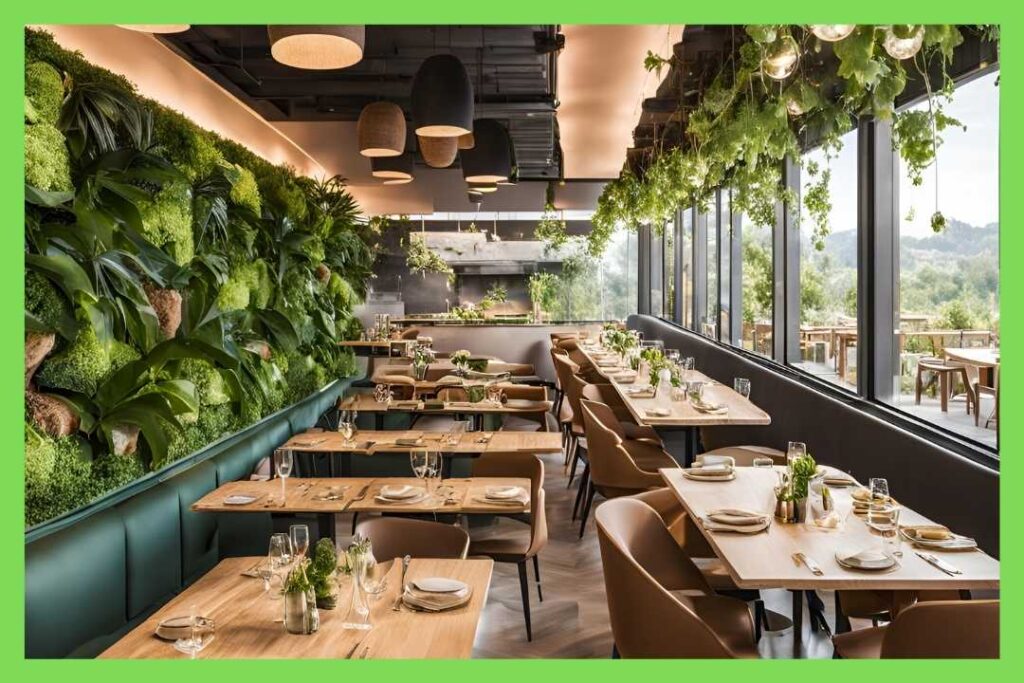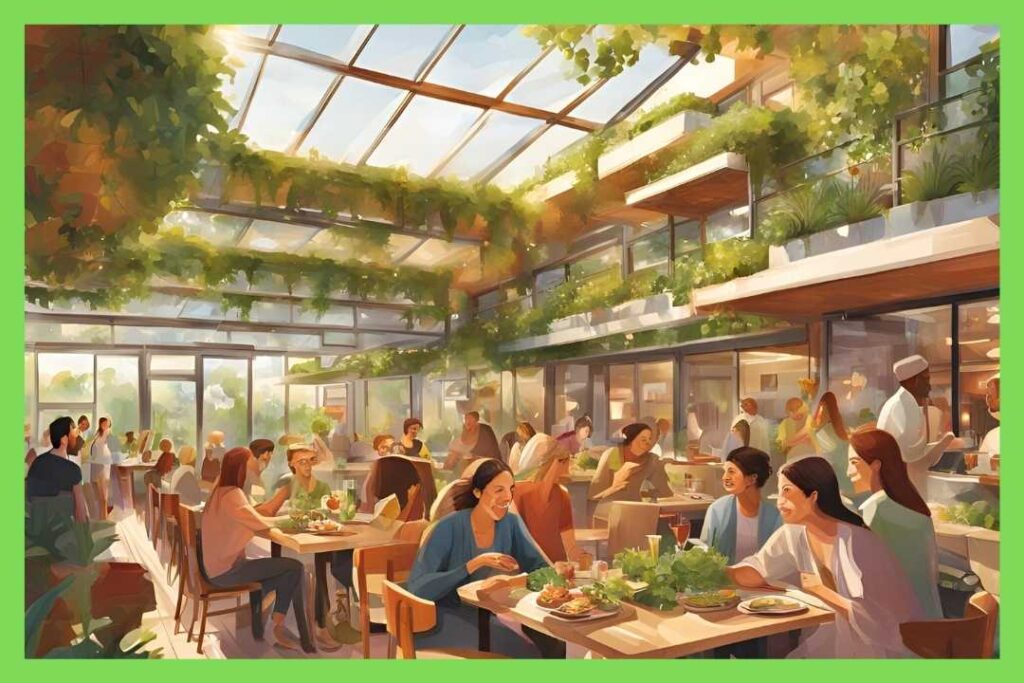Eco-friendly restaurants are changing the dining world for the better. As we move into 2024, these green spots are making dining more sustainable. They offer delicious food that also cares for our planet.
So, what makes these restaurants so special? They use new ways to be green, like plant-based menus and zero-waste kitchens. Learn how they’re making a big difference in the food industry.
More people now want to eat in a way that’s good for the planet. Eco-friendly restaurants are answering this call. They’re showing us how to enjoy great food while protecting our environment. Join us as we explore this exciting shift in dining.
The Rise of Eco-Friendly Dining

The world of dining is changing fast. Now, more people want to eat at places that care about the planet. They look for eco-friendly restaurants and sustainable food options.
Consumer Demand for Sustainable Options
More and more people want to eat in a way that’s good for the planet. A recent survey found that over 70% of diners choose restaurants based on how green they are. This has led to more sustainable restaurants and green eateries opening up everywhere.
Environmental Benefits of Green Eateries
Eco-friendly dining is great for the environment. Green eateries use smart ways to cut down on pollution. They choose organic food options, reduce food waste, and use clean energy. This makes eating out better for the planet and for those who care about it.
| Environmental Benefit | Impact of Eco-Friendly Dining |
|---|---|
| Reduced Carbon Footprint | Eco-friendly restaurants use green energy and cut down on food miles to lower their carbon emissions. |
| Waste Reduction | Green eateries work hard to reduce waste by recycling and composting, sending less to landfills. |
| Water Conservation | Many eco-friendly restaurants save water by using efficient tech and smart water-saving methods. |
The growing need for sustainable restaurants is changing the food industry. It’s moving towards a greener, more responsible future for all of us.
Plant-Based Menus: A Sustainable Choice

Plant-based menus are becoming a big deal in eco-friendly dining. Restaurants are now offering these menus to cut down on environmental harm. They also serve up tasty, healthy food.
Studies show that plant-based diets are much better for the planet than meat-based ones. Restaurants that focus on veggies, fruits, and grains are using less water and cutting down on greenhouse gases. This helps protect our forests and saves water too.
Plant-based menus also mean more organic and local food. This cuts down on the need for long-distance food transport. It supports local farmers and gives diners a unique taste experience.
| Environmental Benefits of Plant-Based Menus | Nutritional Advantages of Plant-Based Meals |
|---|---|
| Reduced carbon footprint Lower water usage Decreased land use and deforestation | Rich in fiber, vitamins, and minerals Lower in saturated fat and cholesterol Potential to reduce the risk of chronic diseases |
More and more people want plant-based menus. Eco-friendly restaurants are leading a food revolution. They focus on being green, healthy, and delicious. This way, diners can enjoy great food and help the planet.
“Plant-based menus are not just a trend, but a powerful solution to the environmental challenges we face. Eco-friendly restaurants are leading the way in this culinary revolution.”
Farm-to-Table: Embracing Local and Seasonal Ingredients
The farm-to-table movement is a big deal in eco-friendly dining. Restaurants are using local, seasonal ingredients. This makes food taste great and helps the local farmers and the planet.
Supporting Local Farmers and Reducing Food Miles
Eco-friendly restaurants work with nearby farmers. This means they get the best ingredients and cut down on carbon emissions. It’s good for the farmers, the local economy, and the environment.
Seasonality and Freshness in Every Bite
These restaurants follow nature’s cycles for their menus. They use spring greens and winter root veggies. This way, every dish is fresh and true to the season, making food taste better and helping the planet.
“Eating locally and seasonally is not just a trend – it’s a way of life that benefits both the environment and our taste buds.”
More people want to eat sustainably, and eco-friendly restaurants are at the forefront. They’re changing how we see food and making our planet healthier.
Zero-Waste Kitchens: Minimizing Food Waste
In the world of eco-friendly dining, a growing trend is the emergence of zero-waste kitchens. These innovative culinary spaces are changing how restaurants handle food waste. They are setting a new standard for sustainability in the industry.
Innovative Strategies for Waste Reduction
Eco-friendly restaurants are using many strategies to cut down on food waste. They plan menus carefully and source ingredients wisely. They also come up with creative recipes to use every part of the food they buy.
- Comprehensive inventory management to reduce over-purchasing
- Innovative cooking techniques that repurpose food scraps and trimmings
- Partnerships with local farms and suppliers to source imperfect produce
- Mindful menu design that optimizes ingredient usage
Composting and Recycling in the Kitchen
Zero-waste kitchens also focus on composting and recycling. They work to reduce their environmental impact. By turning food scraps into soil, they help create a more circular food system.
- On-site composting systems to transform food waste into nutrient-rich soil
- Comprehensive recycling initiatives for non-organic materials like glass, plastic, and metal
- Collaboration with local waste management services to ensure proper disposal and recycling
The rise of zero-waste kitchens shows the industry’s dedication to sustainability. These restaurants lead the way with innovative waste reduction and recycling. They are making a big difference in the world of zero-waste kitchens and organic food options.
Eco-Friendly Dining: Energy Efficiency and Renewable Resources

Eco-friendly restaurants are at the forefront of sustainable dining. They use energy-efficient practices and renewable resources. This makes dining more energy-efficient and carbon-neutral.
These restaurants focus on energy-saving appliances and lights. They use high-efficiency refrigerators, stoves, and LED bulbs. They also have motion-sensor lights to cut down energy use.
Many also use renewable energy like solar panels. Some even have wind turbines or geothermal systems. This helps them power their operations sustainably.
| Energy-Efficient Measures | Renewable Energy Solutions |
|---|---|
| Energy-efficient appliances LED lighting Motion-sensor controls | Solar panels Wind turbines Geothermal systems |
By adopting these practices, restaurants reduce their environmental impact. They also encourage customers to live more sustainably. This trend is making the restaurant industry greener and more sustainable.
“Sustainability is no longer a trend, but a necessity. Eco-friendly restaurants are leading the way in creating a more environmentally conscious dining experience.”
Renewable Energy Solutions for Eco-Friendly Dining
Renewable energy like solar and wind power is gaining traction in restaurants. By using these sources, eco-friendly restaurants cut their carbon footprint. They also inspire customers to live more sustainably.
Organic and Sustainable Food Options
Eco-friendly restaurants are changing the way we eat. They focus on organic and sustainable food. This meets the demand for healthier, eco-friendly meals. They also make sure you know where your food comes from.
The Benefits of Organic Produce and Meat
Organic farming avoids harmful chemicals. It’s better for the planet and gives food more nutrients and taste. Eco-friendly restaurants offer fresh, organic produce and meats without added hormones.
Transparency in Food Sourcing and Labeling
Eco-friendly restaurants are open about their food sources. They label their organic and sustainable options clearly. This builds trust with their customers. You can enjoy your meal knowing it’s good for you and the planet.
FAQ
What are the key features of eco-friendly restaurants?
Eco-friendly restaurants focus on being green. They serve plant-based menus and use farm-to-table cuisine. They also aim for zero waste and use energy-efficient ways to run their dining spaces. Plus, they choose organic and local ingredients.
How are eco-friendly restaurants reducing their environmental impact?
These restaurants use smart strategies to lessen their environmental harm. They cut down on food waste by composting and recycling. They also use renewable energy and buy ingredients locally to reduce food miles.
What are the benefits of a plant-based menu in an eco-friendly restaurant?
Plant-based menus are better for the planet. They have a lower carbon footprint than meat dishes. This choice also meets the growing demand for healthier, eco-friendly food.
How do farm-to-table practices contribute to the sustainability of eco-friendly restaurants?
Farm-to-table practices help these restaurants. They support local farmers and cut down on food miles. This ensures fresh, seasonal ingredients, making dining more sustainable.
What strategies do zero-waste kitchens in eco-friendly restaurants employ to minimize food waste?
Zero-waste kitchens are creative in reducing waste. They compost, recycle, and use every part of ingredients. This way, almost no food goes to waste.
How are eco-friendly restaurants incorporating renewable energy and energy-efficient technologies?
These restaurants use energy-saving appliances and solar power. They also adopt sustainable energy solutions. This helps reduce their carbon footprint and environmental impact.
What are the benefits of organic and sustainable food options in eco-friendly restaurants?
Offering organic and sustainable food is good for health and the planet. It supports local and organic producers. This choice helps build a more sustainable food system.
